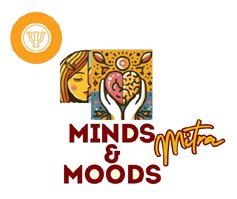Stress and Burnout Management
Stress and burnout have become common challenges in today’s fast-paced world. Whether caused by workplace pressure, relationship conflicts, academic struggles, or personal expectations, unmanaged stress can lead to deep emotional, physical, and mental exhaustion. Stress and burnout management counselling helps individuals regain balance, rebuild confidence, and restore emotional well-being through therapeutic intervention and lifestyle re-alignment. This process is best guided by a skilled psychotherapist, mental health counsellor, or psychologist trained in evidence-based therapies such as Cognitive Behavioral Therapy (CBT), Rational Emotive Behavior Therapy (REBT), and Dialectical Behavior Therapy (DBT).
About RRIMI BODALKAR
RRIMI BODALKAR is a Senior Psychotherapist and Mental Health Counsellor based in Nagpur, holding an M.A. in Psychology (Counselling) and PGDMH (Clinical). She is NSDC Certified in Psychometric Analysis and Learning Style Assessment, and specializes in CBT, REBT, and DBT techniques. With extensive experience in depression therapy, anger management counselling, relationship counselling, and personality development counselling, she provides holistic emotional and psychological support. Her compassionate approach blends traditional therapeutic wisdom with modern psychology, making her one of the most trusted names among psychotherapists and mental health counsellors in Nagpur.
Understanding Stress and Burnout
Stress is the body’s natural response to challenges, while burnout is a state of emotional and physical depletion resulting from prolonged stress. Burnout counselling and stress management therapy aim to help individuals recognize early warning signs, prevent escalation, and regain control over their mental and physical health. Through structured counselling sessions, clients learn coping techniques that improve focus, confidence, and emotional stability.
Common Symptoms of Stress and Burnout
- Emotional symptoms: Irritability, anxiety, depression, or feeling overwhelmed.
- Cognitive symptoms: Difficulty concentrating, forgetfulness, negative thinking patterns.
- Physical symptoms: Headaches, fatigue, insomnia, or muscle tension.
- Behavioral symptoms: Withdrawal, procrastination, loss of motivation, or decreased productivity.
- Workplace symptoms: Job dissatisfaction, absenteeism, and loss of engagement — often requiring workplace stress counselling or executive coaching.
Causes of Stress and Burnout
- Excessive workload and lack of work-life balance.
- Relationship conflicts requiring relationship counselling or couple therapy.
- Perfectionism and negative self-talk, addressed effectively through CBT and REBT.
- Unresolved trauma or emotional wounds, treated with trauma therapy or PTSD counselling.
- Academic and performance pressure among students — often managed through academic stress psychology or school stress counselling.
- Parenting pressure or family responsibilities, where parenting support counsellors and child psychologists play a vital role.
Treatment & Counselling Procedure
Stress and burnout management counselling usually begins with a detailed personality assessment or psychometric evaluation to understand thought patterns, emotional triggers, and behavioral responses. Based on the results, a structured treatment plan is created which may include:
- Cognitive Behavioral Therapy (CBT): Helps identify and reframe negative thoughts causing emotional distress.
- Rational Emotive Behavior Therapy (REBT): Targets irrational beliefs to promote rational, confident behavior.
- Dialectical Behavior Therapy (DBT): Teaches emotional regulation, mindfulness, and distress tolerance.
- Behavioral therapy: Modifies maladaptive behaviors that lead to burnout.
- Mindfulness-based stress reduction (MBSR): Encourages grounding techniques to reduce anxiety.
- Life transition counselling and career counselling psychology for individuals struggling with major personal or professional shifts.
- Public speaking anxiety treatment and confidence-building counselling for professionals facing self-doubt.
During therapy, regular progress assessments such as IQ testing, ADHD testing, or neuropsychological evaluations may be recommended to track cognitive function and tailor intervention strategies. Sports psychology and executive coaching further help clients optimize focus, motivation, and emotional resilience.
Benefits of Counselling for Stress and Burnout
- Improved emotional regulation and resilience.
- Enhanced self-awareness and confidence building.
- Better work-life balance and productivity.
- Reduction in negative thinking and anger management issues.
- Strengthened relationships through improved communication skills.
- Support for special needs children and families through integrated care approaches.
FAQ’s on Stress and Burnout Management
Q1: How do I know if I’m experiencing burnout?
If you constantly feel exhausted, unmotivated, detached from your work or relationships, or emotionally drained, you may be facing burnout. A psychologist or counsellor can assess your symptoms through structured therapy and psychometric assessment.
Q2: Can therapy really help with stress?
Yes. Techniques like CBT, REBT, and DBT have been proven to reduce stress, improve coping mechanisms, and prevent burnout by changing negative thinking and behavioral patterns.
Q3: How long does treatment take?
Duration varies based on individual needs. Generally, noticeable improvement occurs within 6–8 sessions of consistent counselling and lifestyle adjustment.
Q4: Is medication required?
Most stress and burnout counselling programs focus on therapy and behavioral modification. However, if symptoms are severe, a referral to a psychiatrist for medication may be considered.
Q5: Can stress counselling help students and professionals alike?
Absolutely. School stress counselling, academic stress psychology, and workplace stress counselling address stressors specific to each environment, helping both students and professionals thrive.

